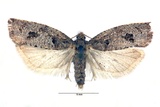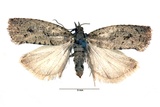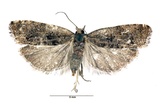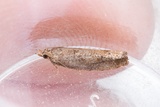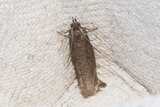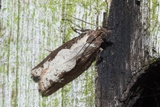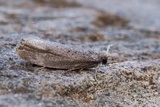Epinotia caprana (Fabricius, 1798) Species
Last modified: May 4, 2024, 12:10 p.m.
A very rare species in Belgium, not often observed.
Details
- Classification
- Family: Tortricidae > Subfamily: Olethreutinae > Tribus: Eucosmini > Genus: Epinotia > Species: Epinotia caprana
- Vernacular names
- Gageloogbladroller (NL), Large Sallow Bell, Large Willow Roller (EN), Großer Salweiden-Wickler (DE)
- Synonyms
- Epinotia semifuscana (Stephens, 1834)
- First mention in Belgium
- Lambillion L.-J. 1912. Varia. — Revue mensuelle de la Société entomologique namuroise 12: 31–32, 40, 51–52, 68, 83–84, 96. On page 31.
- Status
-
Native
Distribution
Imago
Wingspan 16–22 mm. A very variable species. Specimens do occur without the obvious contrast between light and dark, or with obscure markings and these can be confused with related species.
Distinguished from Epinotia sordidana and related species by its whitish grey hindwing
Caterpillar
The young larva is light grey with darker to black warts, head and prothoracic plate black, anal valve greyish to black. As the larva gets older, the head turns brownish, warts become lighter and the anal plate has the same color as the light greyish to whitish body.
Bionomics
The larvae live among spun leaves. The adult is not easily observed, though it does come to light.
Flight periods
The adults are on the wing from mid-July towards late October.
Observed on
- Host plant (species):
- Myrica gale
- Host plant (genera):
- Salix
The main foodplant are narrow-leaved species of Salix, also known from Myrica gale.
Habitat
It frequents wet moorlands, marshes and fens.
